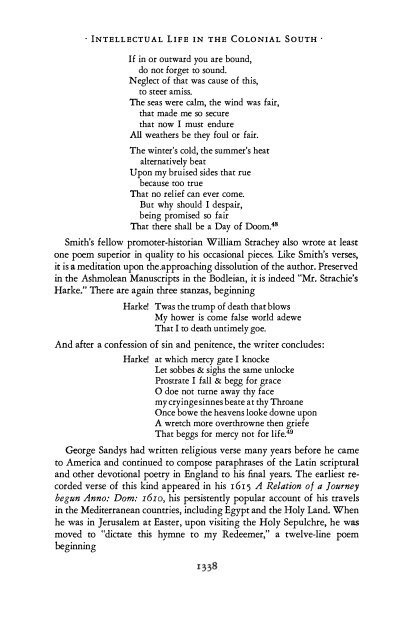Literature, Principally Belletristic - University of Tennessee, Knoxville
Literature, Principally Belletristic - University of Tennessee, Knoxville
Literature, Principally Belletristic - University of Tennessee, Knoxville
You also want an ePaper? Increase the reach of your titles
YUMPU automatically turns print PDFs into web optimized ePapers that Google loves.
· INTELLECTUAL LIFE IN THE COLONIAL SOUTH '<br />
If in or outward you are bound,<br />
do not forget to sound.<br />
Neglect <strong>of</strong> that was cause <strong>of</strong> this,<br />
to steer amiss.<br />
The seas were calm, the wind was fair,<br />
that made me so secure<br />
that now I must endure<br />
All weathers be they foul or fair.<br />
The winter's cold, the summer's heat<br />
alternatively beat<br />
Upon my bruised sides that rue<br />
because too true<br />
That no relief can ever come.<br />
But why should I despair,<br />
being promised so fair<br />
That there shall be a Day <strong>of</strong> Doom.48<br />
Smith's fellow promoter-historian William Strachey also wrote at least<br />
one poem superior in quality to his occasional pieces. Like Smith's verses,<br />
it is a meditation upon the approaching dissolution <strong>of</strong> the author. Preserved<br />
in the Ashmolean Manuscripts in the Bodleian, it is indeed "Mr. Strachie's<br />
Harke." There are again three stanzas, beginning<br />
Harke! Twas the trump <strong>of</strong> death that blows<br />
My hower is come false world adewe<br />
That I to death untimely goe.<br />
And after a confession <strong>of</strong> sin and penitence, the writer concludes:<br />
Harke! at which mercy gate I knocke<br />
Let sobbes & sighs the same unlocke<br />
Prostrate I fall & begg for grace<br />
o doe not turne away thy face<br />
my cryinge sinnes beate at thy Throane<br />
Once bowe the heavens looke downe upon<br />
A wretch more overthrowne then griefe<br />
That beggs for mercy not for life.49<br />
George Sandys had written religious verse many years before he came<br />
to America and continued to compose paraphrases <strong>of</strong> the Latin scriptural<br />
and other devotional poetry in England to his final years. The earliest recorded<br />
verse <strong>of</strong> this kind appeared in his 1615 A Relation <strong>of</strong> a Journey<br />
begun Anno: Dam: 1610, his persistently popular account <strong>of</strong> his travels<br />
in the Mediterranean countries, including Egypt and the Holy Land. When<br />
he was in Jerusalem at Easter, upon visiting the Holy Sepulchre, he was<br />
moved to "dictate this hymne to my Redeemer," a twelve-line poem<br />
beginning















